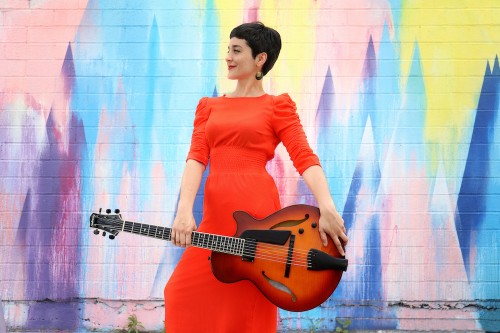Jan 13, 2026 2:09 PM
More Trump-Kennedy Center Cancellations
The fallout from the renaming of the John F. Kennedy Center for the Performing Arts to include President Donald…

Pat Metheny is a touchstone for Camila Meza, who covers the guitarist’s collaboration with David Bowie on Ámbar, her latest recording.
(Photo: Chris Drukker)Singer-songwriter Camila Meza jumped at the opportunity to attempt her own hybrid when bassist Noam Wiesenberg suggested arranging Elliott Smith’s “Waltz #1” for their own group, augmented by a string quartet. The resulting video worked so well that they decided to record an entire album.
Released on Sony Masterworks, Ámbar concentrates on Meza songs alongside material by Antônio Carlos Jobim, Milton Nascimento, Chico Buarque, Tomás Méndez and others.
Over coffee at a Brooklyn cafe, Meza, who first played alongside strings in pianist Fabian Almazan’s band, speculates that growing up as a “classical music nerd” in Santiago, Chile, finally has paid off. “At the beginning of my musical life, maybe because I was rebelling against my dad or something, I didn’t want to hear any classical music,” she said. “But now, I really love it.”
A peak moment in Meza and Wiesenberg’s collaboration occurs midway through the new album’s opening track, “Kallfu,” which means “blue” in the language of southern Chile’s native Mapuche people. The song was inspired by a trip the singer took to Patagonia as a respite from ongoing political traumas in the States. Meza’s clear, cool voice drops out and a string quartet suddenly conjures up birds of various species bursting into song.
“We got that idea from aleatoric writing,” explained Wiesenberg, “which is from the classical world, but perfect for jazz. You give each musician options to choose from, five notes they can use in any order or length. It ended up being really cool, because it’s different at every show.”
Meza and Wiesenberg each cite eclectic pop star Björk’s string arrangements as a point of reference, with Camila adding Nick Drake’s recordings and Laura Mvula’s 2013 soul-jazz debut, Sing To The Moon (RCA).
Ámbar follows the guitarist’s 2016 release, Traces (Sunnyside), in focusing on her original compositions. “Atardecer,” “Fall” and the title track (a tribute to her late grandfather) were among the first songs she wrote upon arriving in New York a decade ago. “They’re explorations that waited for the right circumstance to bloom,” Meza said. “I was way more judgmental about my work back then, but that attitude has changed.”
These songs, Meza said, speak to the human connections that might yet redeem us. “All Your Colors,” the program’s sophisticated jazz-pop centerpiece, likewise was “born from the feeling of intense love of a person, but also the acknowledgement that love needs effort, it needs work. You can fulfill the potential of really loving when you realize that it’s a work of art.”
“All Your Colors” also suggests the sense-shifting phenomenon of synesthesia, which Meza experiences—“but in a strange and personal way,” she said with a laugh. “Some tonalities or chords are colors for me: G major is blue, D major is orange and B minor is totally yellow.”
Like her songwriting, Meza’s guitar playing and singing have also been evolving. “My singing has made my playing more lyrical,” she said, “and less ‘guitaristic.’ It was important to me to be able to reach the same level of expression on guitar as with my voice.”
On the other hand, her guitar helps her explore less intuitive musical ideas: “They teach each other.”
Pat Metheny remains a touchstone for the bandleader, who, at his invitation, arranged a medley of his compositions performed last year by five guitarists at his NEA Jazz Masters induction ceremony at the Kennedy Center in Washington, D.C. On Ámbar, Meza delivers an emotionally searing version of Metheny and David Bowie’s “This Is Not America.”
Playing in trombonist Ryan Keberle’s politically engaged band Catharsis has “definitely amplified my own ideas about music and message,” the 34-year-old said. As the daughter of two journalists, she was surrounded by commentary on current affairs as a youth: “I had so much news in my house as a teenager that I didn’t want to know anything about the world.”
But nowadays, things definitely have changed. “It would be easy and comfortable to not talk about what’s going on in the world,” she said. “But I feel an inherent responsibility. Let’s open up our hearts and really heal ourselves as a society.” DB

Belá Fleck during an interview with Fredrika Whitfield on CNN.
Jan 13, 2026 2:09 PM
The fallout from the renaming of the John F. Kennedy Center for the Performing Arts to include President Donald…

Peplowski first came to prominence in legacy swing bands, including the final iteration of the Benny Goodman Orchestra, before beginning a solo career in the late 1980s.
Feb 3, 2026 12:10 AM
Ken Peplowski, a clarinetist and tenor saxophonist who straddled the worlds of traditional and modern jazz, died Feb. 2…

The success of Oregon’s first album, 1971’s Music Of Another Present Era, allowed Towner to establish a solo career.
Jan 19, 2026 5:02 PM
Ralph Towner, a guitarist and composer who blended multiple genres, including jazz — and throughout them all remained…

Rico’s Anti-Microbial Instrument Swab
Jan 19, 2026 2:48 PM
With this year’s NAMM Show right around the corner, we can look forward to plenty of new and innovative instruments…

Richie Beirach was particularly renowned for his approach to chromatic harmony, which he used to improvise reharmonizations of originals and standards.
Jan 27, 2026 11:19 AM
Richie Beirach, a pianist and composer who channeled a knowledge of modern classical music into his jazz practice,…